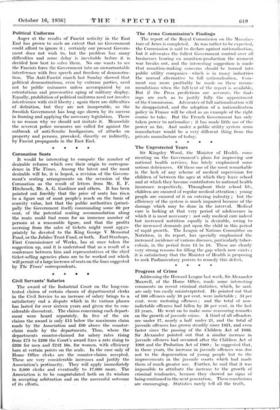Progress of Crime Addressing the Howard League last week, Sir
Alexander Maxwell, of the Home Office, made some interesting comments on recent criminal statistics, which, he said, are only too easily misinterpreted. He pointed out that of 100 offences only 10 per cent. were indictable ; 51 per cent. were motoring offences ; and the total of non- indictable offences had fallen by 50 per cent, in the last 25 years. He went on to make some reassuring remarks on the growth of juvenile crime. A third of all offenders are under 17, nearly a half under 21, and the total of juvenile offences has grown steadily since 1921, and even faster since the passing of the Children Act of- 1988. Sir Alexander pointed out that a similar increase in juvenile offences had occurred after the Children Act of 1908 and the Probation Act of 1909; he suggested that, in those years, the increase in juvenile offences was due not to the degeneration of young people but to the improvements in the juvenile courts which had made them of much greater use. Further, he said that it was impossible to attribute the increase to the growth of criminal tendencies, because they showed no signs of being continued-in the next generation. These conclusions are .encouraging-. Statistics rarely tell all the truth.




















































 Previous page
Previous page